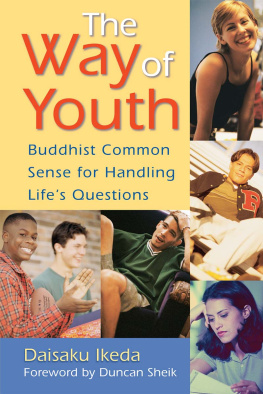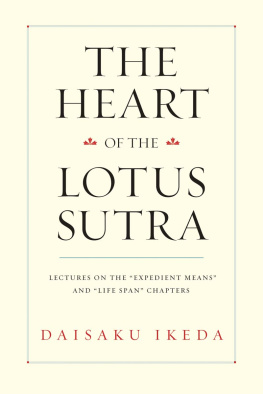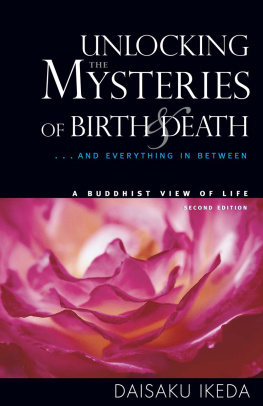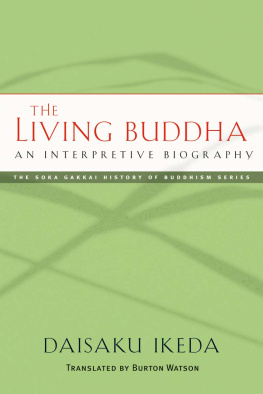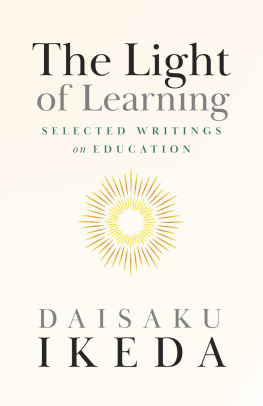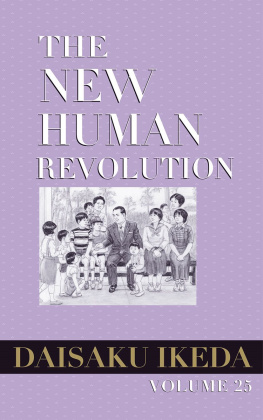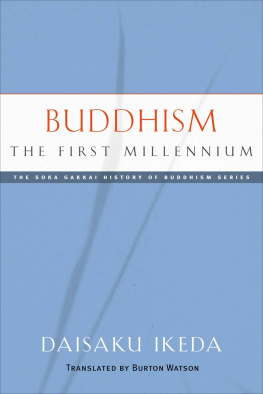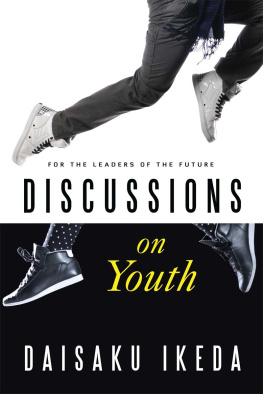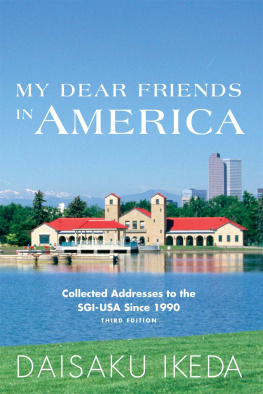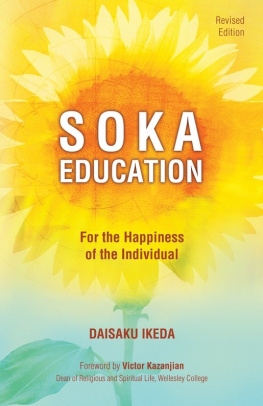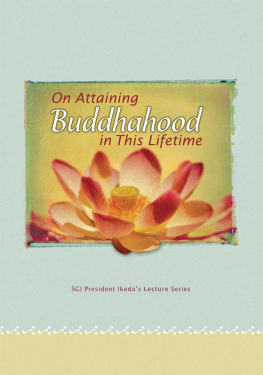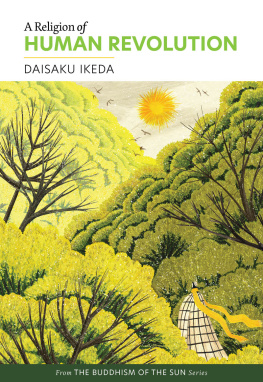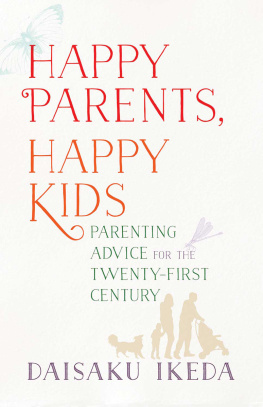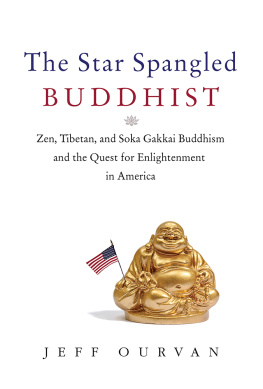

Published by Middleway Press
A division of the SGI-USA
606 Wilshire Blvd., Santa Monica, CA 90401
2000 Soka Gakkai
ISBN 978-0-9674697-0-6
Cover and Interior Design by Lightbourne, Inc.
All rights reserved
Printed in the United States of America
10 9
Library of Congress Cataloging-in-Publication Data
Ikeda, Daisaku.
The way of youth : Buddhist common sense for handling lifes questions / Daisaku Ikeda.
p. cm.
ISBN 0-9674697-0-8 (pbk. : alk. paper)
1. Religious life--Soka Gakkai. 2. Youth--Religious life.
3. Youth--Conduct of life. I. Title.
BQ8436 .I36 2000
00-008506
294.34440835--dc21
CIP
FOREWORD
At the age of nineteen, profoundly dissatisfied with my inability to steer the course of my life and less than impressed with the direction the modern world seemed to be taking, I began practicing Buddhism. It seemed to be the only philosophy that, while never contradicting my rational, scientific view of the universe, acknowledged its mystery and wonder. Buddhism imbued the universe and our human place in it with great dignity and freedom.
In the ten years since, my appreciation for Buddhist ideas has only deepened. Perhaps more important, my personal Buddhist practice has galvanized my life in ways I never could have imagined. In so many ways, I owe these feelings of appreciation to Daisaku Ikeda. As the leader of the Soka Gakkai International, the lay Buddhist organization of which I am a member, he has worked tirelessly to encourage, and enlighten, millions of people around the world.
My fellow lay Buddhists and I chant Nam-myoho-renge-kyo each morning and evening as part of our daily practice. While I would strongly encourage absolutely anyone to try this practice for their own growth and benefit, Buddhist philosophy, particularly as it is expounded by Daisaku Ikeda, comprises a world of ideas that can be enormously beneficial to Buddhists and non-Buddhists alike. In other words, just because you dont practice Buddhism, it doesnt mean you wont get a lot out of this book. That is because, on a practical level, Buddhism is reason; it is no different from common sense.
Of course, most of us know that we dont always use our common sense, that we dont always see things reasonably. The computer science visionary Marvin Minsky has a good explanation for this. He says, Common sense is not a simple thing. Instead, it is an immense society of hard-earned practical ideas of multitudes of life-learned rules and exceptions, dispositions and tendencies, balances and checks. That happens also to be a fairly good description of Buddhism.
In the following pages, you will read a series of young peoples questions and concerns presented to Daisaku Ikeda. Though some of the issues raised may seem simple, there are very profound ideas embedded within Mr. Ikedas straightforward replies. His advice to us is compassionate, empowering. Through following it, we come to recognize our ability to take control of our individual destiny. On a personal note, I find he offers poignant advice concerning love and relationships that would have saved me a lot of grief had I seen it ten years ago.
Fortunately, the advice I did take strengthened my resolve to change the things about myself that were holding me back from accomplishing my creative goals. Before I started practicing Buddhism and reading Daisaku Ikedas guidance, I couldnt bear to sing in public I didnt like the sound of my own voice and was painfully self-conscious on stage. It is no coincidence that seven years later, my first album went gold, I was nominated for a Grammy for Best Male Vocal performance, and I toured all over the world, performing in front of millions of people.
Lately, I have been reading a lot about computers and their evolving place in our world. Suffice to say that, from all reports, the coming decades will be filled with changes we cant even imagine changes that will completely alter the landscape of our society socially, culturally and politically. Of course, life itself is based on constant change. As many have pointed out, the only constant is change. This is why it is imperative to find a philosophy that can carry us through these times, to embrace the positive changes and show us how to deal with the negative ones.
The truly important point Mr. Ikeda constantly underlines is that it is up to us, the generation of youth, to guide these changes and to create this new world. Not only do we all have the inherent ability to affect these changes, but we have the responsibility to do so in a wise, compassionate manner.
Thanks to Daisaku Ikeda, I have found that a life led with a Buddhist perspective can be rich, fascinating and ultimately joyful. And I think thats what its all about, being happy, creative and filled with appreciation for life in all its excellent manifestations.
Duncan Sheik
PREFACE
I have a dream! were the words of Dr. Martin Luther King Jr. What are your dreams? What are your hopes? Nothing is stronger than a life full of hope.
Every day I get letters from young people all over the world, and I talk with young men and women whenever I have a chance. I find many young people who are brimming with hope and enthusiasm, but others I come across seem to be weighed down with troubles of one kind or another. Youth is a time for growth and change, but it can also be a time of great worries. Young people at times feel ill at ease in society, as though they were abandoned alone in some sort of wilderness or battlefield. They may feel theres no one they can trust, that no one cares about them, that they havent any goal in life.
But wait! Is it right to underrate yourself so? Should you have such a low opinion of your abilities? Theres no one who doesnt have some mission, some purpose in this world. And this sense of mission and purpose is what gives clear meaning and satisfaction to peoples lives.
When I was nineteen, I met Josei Toda, the man who became my lifelong teacher. Even now I can never forget the kind words he spoke to me more than forty years ago, when I was going through a very difficult period. Daisaku, he said, young people have to have their troubles. Troubles are what make a first-rate person of you!
Every morning, even on Sundays, Mr. Toda acted as my private tutor, instructing me in all sorts of subjects. And I have tried in the same way to talk with young people whenever Ive had the chance. Out of those discussions has come the material in the book that follows. Most of these discussions of course were with young people of Japan. But the subjects we discussed family, friends, dreams, goals in life I am certain are of concern to young people everywhere in the world.
I and the young people I talked with in most cases had in common our practice of Nichiren Buddhism. Nichiren, a thirteenth-century Japanese Buddhist teacher and reformer, taught that each human life has infinite potential, and revealed an easily accessible way by which everyone can nurture this potential and find true happiness in life, a way that he learned from the Lotus Sutra.
This philosophy taught by Nichiren is based upon absolute respect for life and for the worth of each individual. And because I hope to share this universally valid philosophy with ordinary readers in America and other English-speaking countries, I have asked the editors of Middleway Press to help me put together this book in English, based on a series of talks I had with high school students.
Next page
